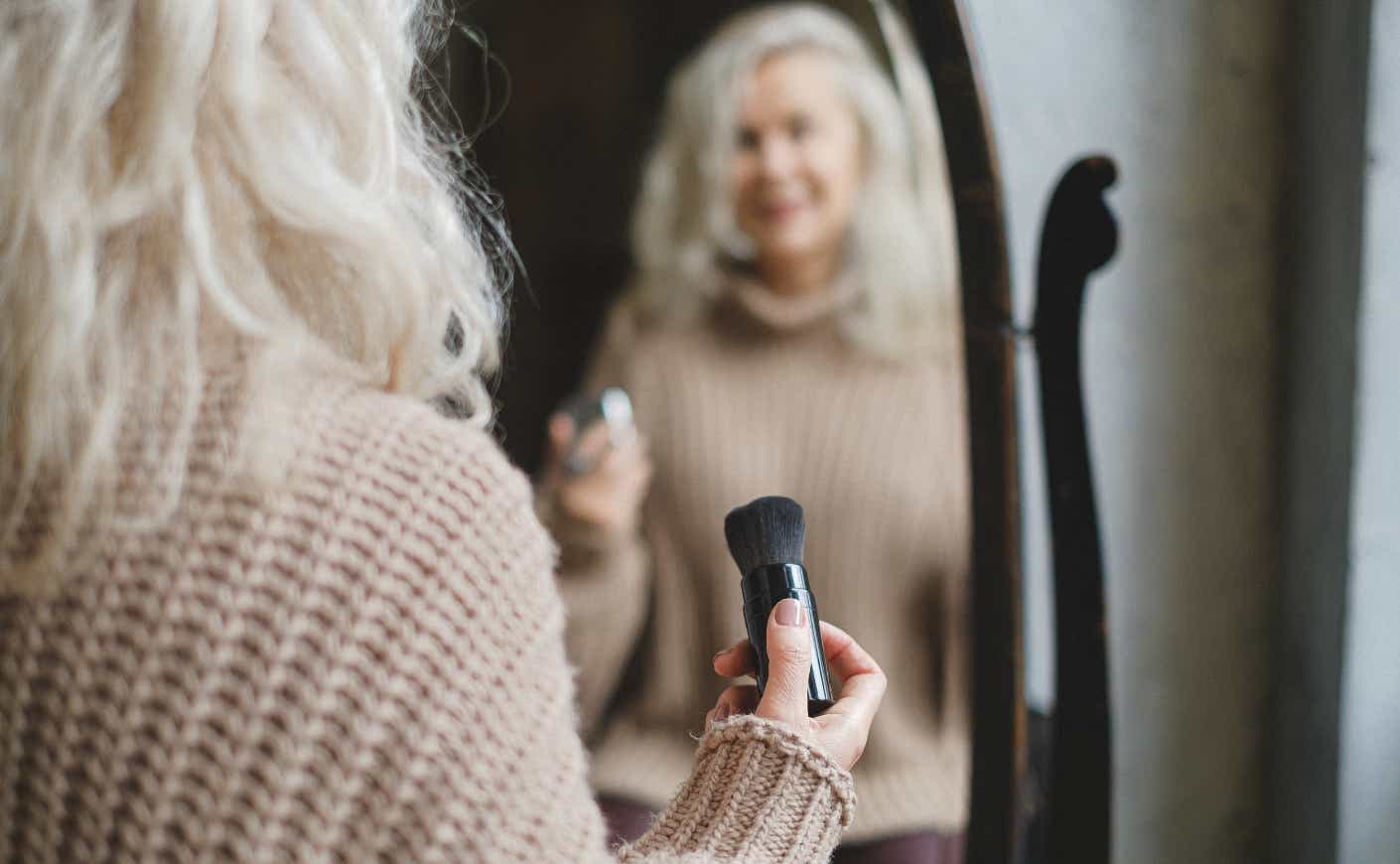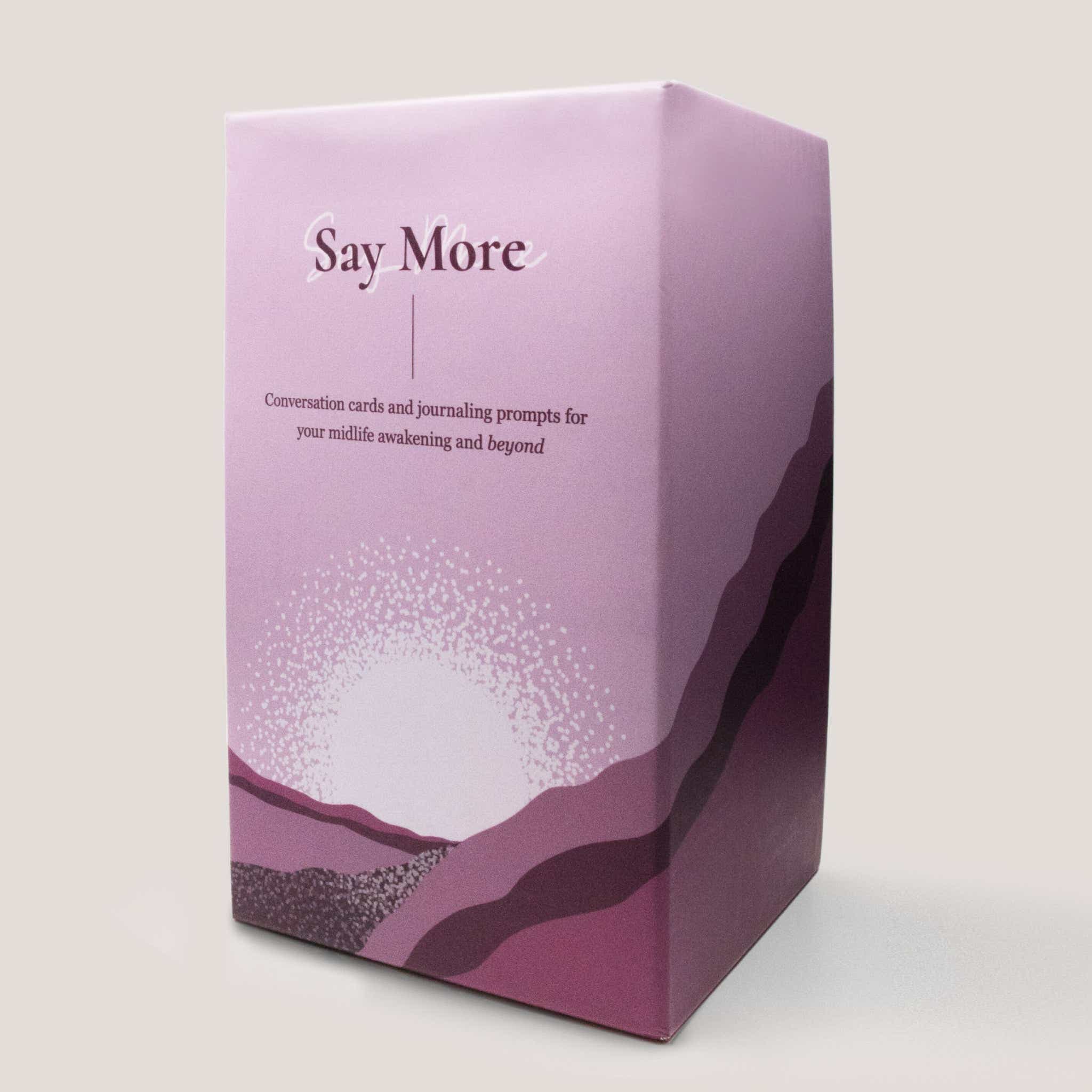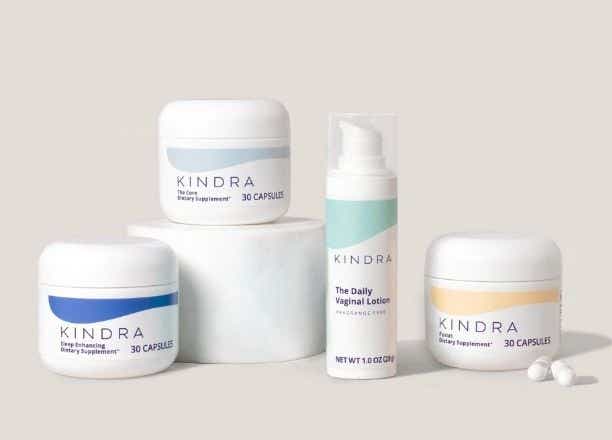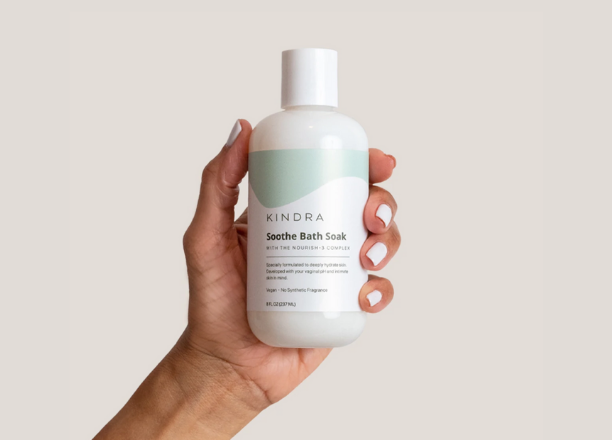Do you feel like you’re not seen as beautiful anymore — or even noticed at all? Maybe it feels like you’ve lost yourself in the daily grind and barely recognize the person staring back at you in the mirror. Sadly, it’s common to feel ignored or unappreciated during middle age. In fact, as many as 70 percent of women say they start to feel “invisible” as young as age 52. This phenomenon can lead to anxiety, depression, and withdrawal from social outings or other opportunities for connection.
Of course, sometimes those mental health effects are unavoidable, especially if you’re going through peri/menopause. “Your estrogen and progesterone balance shifts, but that’s not an imbalance,” says Suzanne Gilberg-Lenz, MD, an OB-GYN specializing in integrative women’s health and a medical advisor for Kindra. “It’s physiologic. The transitions happening in your body can change how you feel in your body.” When sleep disruption, vaginal dryness, mood swings, and hot flashes pile up, it’s a combo that would make anyone feel uncomfortable. But there are plenty of steps you can take to feel better in your body and rev up your self-confidence in midlife.
“Locating online communities online that support your perspective and offer you solutions, educating yourself, and doing things you enjoy can be healing,” says Dr. Suzanne. “And that includes not doing things you don’t like, if you don’t have to do them for survival.”
Think of revamping your perspective as an inside job, one you have control over. “In the end, we have agency over our own existence and lives. We get to take back that power over how we move through the world,” says Dr. Suzanne.
Here are six expert-approved ways to reignite your inner light and start feeling not just visible but vibrant in your second act.
Accept that aging is a natural part of life
Getting older (and wiser) is worth embracing. After all, there’s no way to stop our biological clocks from ticking. “We can blame society and say, ‘Society doesn’t value or emphasize women after a certain age,’ or we can look at it from what psychologists call an internal locus of control where we look at how we can control and shape our own experience,” says Chloe Carmichael, Ph.D., a clinical psychologist and author of Nervous Energy: Harness the Power of Your Anxiety. “I encourage women to think about their own beliefs and behaviors, and how they can shape and control those, rather than focus on the expectations they imagine society is placing upon them.”
Open up about how you’re feeling with yourself and your inner circle
Omisade Burney-Scott thinks it’s vital to break through the taboos and talk openly about getting older. She’s the founder of Black Girl’s Guide to Surviving Menopause, a podcast, community, and resource for Black women, women-identified, and gender-expansive people that holds conversations around the shared experience of aging.
“When you have the audacity to live inside of a body that’s identified as woman, femme, or gender-neutral, and you’re also Black, or fat, or poor, or old, or queer, you get pushed even further to the margins, and don’t feel like there’s a space for you to be honest around what you don’t know, what you’re afraid of, what you’re curious about, and what you want to explore,” says Burney-Scott. That’s why she teamed up with our friends at Kindra to create the Say More Conversation Deck, a curated collection of conversation cards and journal prompts designed to help you open up the dialog around how you’re feeling during your new life stage.
“We want to give people an opportunity to remember that we don’t operate in a vacuum. Nothing that we see in the world or experience as an individual doesn’t have a context,” says Burney-Scott. Spending time sifting through the card deck can help reveal how you’re showing up on your menopausal journey.
The Say More Deck explores themes like rising into your own and becoming more aware of your thoughts by posing questions that’ll guide you to reflect deeply such as, How can you take up more space in your life? How can you encourage others to do the same? and When was the last time you were aware (or made aware) of your age? How did that feel?
“I feel very passionately that storytelling is the thing that helps you connect, learn, unlearn, heal, and deepen your political analysis or awareness,” says Burney-Scott. “We’re in a liminal space between one iteration of ourselves to the next and we can illuminate that and use tools like the Say More deck to help people talk about it.”
Try a new journaling exercise
The benefits of journaling are almost immeasurable. Research shows that writing down what you’re grateful for can not only bring balance to your life, it also helps boost everyday satisfaction. Whether you’ve never picked up a journal before, or can’t go a day without jotting down your thoughts, there’s one exercise in particular that can help you reclaim power in certain areas of your life. Dr. Carmichael calls this more structured journaling practice “the zone of control.”
“You take a topic like aging and put all the things you can control about it in one column, and put all the things you cannot control about the issues on the other side of your paper,” says Dr. Carmichael. “Next to things you can control, you write down what steps you can take to control it.”
For example, if you’re afraid of getting weaker or frail, you might write down what you can do to control that fear, like going to a gym class or lifting more weights. “Then, when you start to feel restless or nervous about the topic of aging, instead of sitting there stewing it over, you can look at your journal entry where you listed out the things you can control and what you can do, and get to work on doing those things,” says Dr. Carmichael. “It sounds logical and straightforward, but since these subjects are so emotional, it can be very helpful to have it written out in front of you in a chart you’ve made in your journal. You can consciously choose not to dwell on the things that you know you cannot control.”
Show yourself and your clothes some love
Maybe it feels childish to worry about what you’re wearing when you’ve got a million other tasks on your to-do list. But there’s power in wearing clothes that fit well and make you feel good. And if you’re lost about what to wear, or have a closet full of clothes that no longer fit or bring you joy, Dr. Carmichael suggests hiring a wardrobe consultant, stylist, or trying out an online subscription service like Stitch Fix.
“A lot of women feel like it’s silly to be preening in front of the mirror after a certain age,” says Dr. Carmichael. “We need to destigmatize vanity and recognize that we can be both mature and somebody who takes pleasure and enjoyment in our own appearance.”
Consulting with a stylist can also help boost your morale and give you the inspiration to look and feel your best. “Tell the stylist you’re in a new season and that you’d like them to push you outside of your comfort zone to try new things, because you’re in the process of discovery,” says Dr. Carmichael. “Reframe that sense of not knowing what to wear or what looks good at you from an overwhelmingly negative feeling to a more curious excitement. There’s a brand new canvas in front of you that you get to try a variety of looks on.” Treating yourself to a new beauty treatment, makeover, or perfume can also reap similar benefits.
And remember: it’s okay to give yourself a wink next time you pass by a mirror. “When you take away permission to gaze at yourself, you’re guiding others to do the same,” says Dr. Carmichael. “If you don’t look like you’re spending time and attention on yourself and enjoying your own visibility, that doesn’t help others become drawn to you, either.”
Get professional photos taken once or twice a year
Seeing yourself through a new lens, like that of a professional photographer, can be a catalyst for changing the way you view yourself. Just make sure you find someone who has experience taking photos of people in your age group. “The last thing you want is to feel like the photographer is only used to shooting 20-something fashion models and don’t know how to bring out the richness of a more seasoned type of appearance,” says Dr. Carmichael.
“This helps start a virtuous circle: As you pay more attention to yourself through clothes, or makeup, or photos, then other people will start to notice you, too. As you get that feedback, it starts to create a new vitality around your appearance,” says Dr. Carmichael. “There’s a sense of personal empowerment, growth, and self-esteem that can occur when we start to expand the horizons and boundaries of our identity.”
Learn how menopause changes your body
Connecticut-based executive Tina Scull was diagnosed with breast cancer in 2016. “Mine was HER2 positive so it was caused by hormones mostly due to menopause,” says Scull. When Scull began experiencing vaginal dryness, she was advised not to take anything with added hormones unless it had a very small dose. But even that made her nervous.
When she learned about Kindra, which makes non-hormonal supplements and products designed to relieve menopause symptoms (through Katie’s very own newsletter!), her life changed. “The Kindra products don’t stress me out or hurt me,” says Scull, who uses the brand’s Daily Vaginal Lotion, supplements, and Soothe Bath Soak regularly.
“I think women need to understand what menopause does to them and really focus on what happens during that time and what supplements they can take to help them feel better,” says Scull. “My gynecologist is male and he never sat me down to talk about menopause and the effects it has on my body.”
That’s why she encourages women to research and experiment and to learn about what their bodies go through during menopause. “I have some friends who speak very freely about menopause, and some who don’t talk about it at all. And we’re all going through it,” says Scull. “When women feel they might need to take a supplement or they’re looking for guidance, they don’t know where to go and that’s the invisible part.”
Kindra Products That Will Help You Feel Your Best During Peri/Menopause
Say More Conversation & Journaling Cards
Kindra
Stock up on these brand new Say More conversation and journaling cards which are intentionally designed to help you open up, learn more, and connect with others over your experience with aging and menopause. Created in collaboration with Omisade Burney-Scott of The Black Girl’s Guide to Surviving Menopause, the deck is filled with 100 prompts and 24 wild cards. Invite yourself to dig deep with a little assistance from the carefully curated questions and exercises.
Full Regimen
Kindra
“I’m a huge fan of Kindra supplements because I’m a breast cancer survivor, so I can’t use estrogen systemically,” says Dr. Suzanne. “Kindra’s products help me sleep better and I don’t hot flash anymore because of them.” The Full Regimen set includes each of Kindra’s cult faves: Core and Focus supplements (reduces hot flash symptoms and helps you feel fresh and alert), Daily Vaginal Lotion ( dramatically relieves vaginal dryness and boosts lubrication), and Sleep supplements (assists with giving you a better night’s sleep).
Soothe Bath Soak
Kindra
“Anybody, at any age, who doesn’t sleep well is going to have changes in their mood,” says Dr. Suzanne. Before bed, pamper yourself with a relaxing bath using Kindra’s soothing bath soak. It’s designed to nourish vaginal dryness and it’s made with sensitive skin and your vaginal pH in mind. This go-to is also infused with calming chamomile, which can help ease your mind before you get Zzzs. In fact, 87 percent of women reported feeling calmed and relaxed after use.












